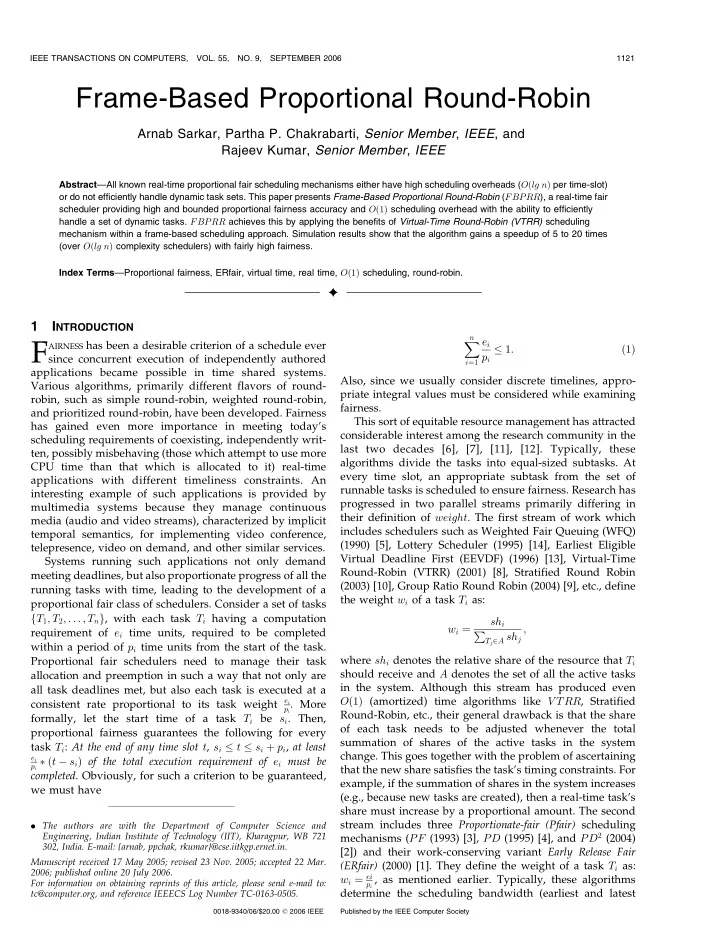

IEEE TRANSACTIONS ON COMPUTERS, VOL. 55, NO. 9, SEPTEMBER 2006 1121 Frame-Based Proportional Round-Robin Arnab Sarkar, Partha P. Chakrabarti, Senior Member , IEEE , and Rajeev Kumar, Senior Member , IEEE Abstract —All known real-time proportional fair scheduling mechanisms either have high scheduling overheads ( O ð lg n Þ per time-slot) or do not efficiently handle dynamic task sets. This paper presents Frame-Based Proportional Round-Robin ( FBPRR ), a real-time fair scheduler providing high and bounded proportional fairness accuracy and O ð 1 Þ scheduling overhead with the ability to efficiently handle a set of dynamic tasks. FBPRR achieves this by applying the benefits of Virtual-Time Round-Robin (VTRR) scheduling mechanism within a frame-based scheduling approach. Simulation results show that the algorithm gains a speedup of 5 to 20 times (over O ð lg n Þ complexity schedulers) with fairly high fairness. Index Terms —Proportional fairness, ERfair, virtual time, real time, O ð 1 Þ scheduling, round-robin. Ç 1 I NTRODUCTION n e i F AIRNESS has been a desirable criterion of a schedule ever X � 1 : ð 1 Þ p i since concurrent execution of independently authored i ¼ 1 applications became possible in time shared systems. Also, since we usually consider discrete timelines, appro- Various algorithms, primarily different flavors of round- priate integral values must be considered while examining robin, such as simple round-robin, weighted round-robin, fairness. and prioritized round-robin, have been developed. Fairness This sort of equitable resource management has attracted has gained even more importance in meeting today’s considerable interest among the research community in the scheduling requirements of coexisting, independently writ- last two decades [6], [7], [11], [12]. Typically, these ten, possibly misbehaving (those which attempt to use more algorithms divide the tasks into equal-sized subtasks. At CPU time than that which is allocated to it) real-time every time slot, an appropriate subtask from the set of applications with different timeliness constraints. An runnable tasks is scheduled to ensure fairness. Research has interesting example of such applications is provided by progressed in two parallel streams primarily differing in multimedia systems because they manage continuous their definition of weight . The first stream of work which media (audio and video streams), characterized by implicit includes schedulers such as Weighted Fair Queuing (WFQ) temporal semantics, for implementing video conference, (1990) [5], Lottery Scheduler (1995) [14], Earliest Eligible telepresence, video on demand, and other similar services. Virtual Deadline First (EEVDF) (1996) [13], Virtual-Time Systems running such applications not only demand Round-Robin (VTRR) (2001) [8], Stratified Round Robin meeting deadlines, but also proportionate progress of all the (2003) [10], Group Ratio Round Robin (2004) [9], etc., define running tasks with time, leading to the development of a the weight w i of a task T i as: proportional fair class of schedulers. Consider a set of tasks f T 1 ; T 2 ; . . . ; T n g , with each task T i having a computation sh i w i ¼ ; requirement of e i time units, required to be completed P T j 2 A sh j within a period of p i time units from the start of the task. where sh i denotes the relative share of the resource that T i Proportional fair schedulers need to manage their task should receive and A denotes the set of all the active tasks allocation and preemption in such a way that not only are in the system. Although this stream has produced even all task deadlines met, but also each task is executed at a e i O ð 1 Þ (amortized) time algorithms like V TRR , Stratified consistent rate proportional to its task weight p i . More Round-Robin, etc., their general drawback is that the share formally, let the start time of a task T i be s i . Then, of each task needs to be adjusted whenever the total proportional fairness guarantees the following for every summation of shares of the active tasks in the system task T i : At the end of any time slot t , s i � t � s i þ p i , at least change. This goes together with the problem of ascertaining e i p i � ð t � s i Þ of the total execution requirement of e i must be that the new share satisfies the task’s timing constraints. For completed . Obviously, for such a criterion to be guaranteed, example, if the summation of shares in the system increases we must have (e.g., because new tasks are created), then a real-time task’s share must increase by a proportional amount. The second stream includes three Proportionate-fair (Pfair) scheduling . The authors are with the Department of Computer Science and mechanisms ( PF (1993) [3], PD (1995) [4], and PD 2 (2004) Engineering, Indian Institute of Technology (IIT), Kharagpur, WB 721 302, India. E-mail: {arnab, ppchak, rkumar}@cse.iitkgp.ernet.in. [2]) and their work-conserving variant Early Release Fair Manuscript received 17 May 2005; revised 23 Nov. 2005; accepted 22 Mar. (ERfair) (2000) [1]. They define the weight of a task T i as: 2006; published online 20 July 2006. w i ¼ ei p i , as mentioned earlier. Typically, these algorithms For information on obtaining reprints of this article, please send e-mail to: determine the scheduling bandwidth (earliest and latest tc@computer.org, and reference IEEECS Log Number TC-0163-0505. 0018-9340/06/$20.00 � 2006 IEEE Published by the IEEE Computer Society
Recommend
More recommend